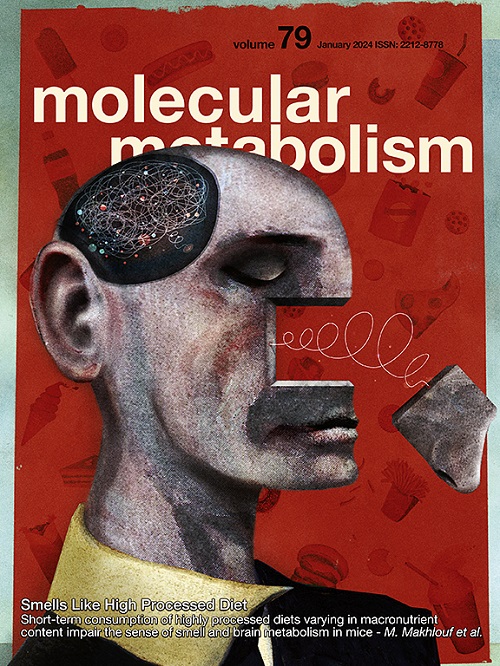肥胖小鼠小肠上皮细胞的生物能量适应减少细胞分化,增强肠道通透性。
IF 7
2区 医学
Q1 ENDOCRINOLOGY & METABOLISM
引用次数: 0
摘要
背景:肥胖和超重与脂肪组织扩张引起的低度炎症有关,并因肠道内稳态改变而持续存在,包括上皮通透性增加。肠上皮的功能是由肠上皮细胞(IEC)线粒体功能支持的。方法和结果:在这里,我们报道了小鼠饮食诱导的肥胖(DIO)诱导了脂质代谢适应,有利于IEC中的脂质储存,同时减少了IEC线粒体的数量,改变了动力学和氧化磷酸化活性。利用空肠上皮细胞系IPEC-J2,我们发现IEC脂质代谢和氧化应激机制适应先于线粒体生物能适应。此外,我们揭示了IEC能量状态与增殖/分化平衡之间的复杂联系,因为在空肠类器官中使用AMPK激活剂AICAR增强线粒体功能可减少增殖并启动IEC分化,反之亦然。我们证实,在DIO小鼠中观察到的IEC线粒体功能降低与增殖增加和分化减少有关,促进了DIO小鼠空肠上皮中允许性Cldn2的表达。结论:我们的研究揭示了过量的脂质摄入减少了IEC的线粒体数量,减少了IEC分化,从而增加了上皮通透性,从而为肥胖中IEC的代谢适应提供了新的见解。本文章由计算机程序翻译,如有差异,请以英文原文为准。

Bioenergetic adaptations of small intestinal epithelial cells reduce cell differentiation enhancing intestinal permeability in obese mice
Objective
Obesity and overweight are associated with low-grade inflammation induced by adipose tissue expansion and perpetuated by altered intestinal homeostasis, including increased epithelial permeability. Intestinal epithelium functions are supported by intestinal epithelial cells (IEC) mitochondria function. However, diet-induced obesity (DIO) may impair mitochondrial activity of IEC and consequently, intestinal homeostasis. The aim of the project was to determine whether DIO alters the mitochondrial function of IEC, and what are the consequences on intestinal homeostasis.
Methods
C57Bl/6J mice were fed a control diet for 22 weeks or a high fat diet (58 kcal% fat). Bioenergetic adaptations of IEC were evaluated on isolated crypts and villi from mouse jejunum. To determine the link between mitochondrial function and alterations of intestinal homeostasis in response to lipid overload, we used the jejunal epithelial cell line IPEC-J2 in vitro and mouse jejunum organoids.
Results
Here, we report that DIO in mice induced lipid metabolism adaptations favoring lipid storage in IEC together with reduced number, altered dynamics and diminished oxidative phosphorylation activity of IEC mitochondria. Using the IPEC-J2 cell line, we showed that IEC lipid metabolism and oxidative stress machinery adaptations preceded mitochondrial bioenergetic ones. Moreover, we unraveled the intricate link between IEC energetic status and proliferation / differentiation balance since enhancing mitochondrial function with the AMPK activator AICAR in jejunal organoids reduced proliferation and initiated IEC differentiation and conversely. We confirmed that the reduced IEC mitochondrial function observed in DIO mice was associated with increased proliferation and reduced differentiation, promoting expression of the permissive Cldn2 in the jejunal epithelium of DIO mice.
Conclusions
Our study provides new insights into metabolic adaptations of IEC in obesity by revealing that excess lipid intake diminishes mitochondrial number in IEC, reducing IEC differentiation that contribute to increased epithelial permeability.
求助全文
通过发布文献求助,成功后即可免费获取论文全文。
去求助
来源期刊

Molecular Metabolism
ENDOCRINOLOGY & METABOLISM-
CiteScore
14.50
自引率
2.50%
发文量
219
审稿时长
43 days
期刊介绍:
Molecular Metabolism is a leading journal dedicated to sharing groundbreaking discoveries in the field of energy homeostasis and the underlying factors of metabolic disorders. These disorders include obesity, diabetes, cardiovascular disease, and cancer. Our journal focuses on publishing research driven by hypotheses and conducted to the highest standards, aiming to provide a mechanistic understanding of energy homeostasis-related behavior, physiology, and dysfunction.
We promote interdisciplinary science, covering a broad range of approaches from molecules to humans throughout the lifespan. Our goal is to contribute to transformative research in metabolism, which has the potential to revolutionize the field. By enabling progress in the prognosis, prevention, and ultimately the cure of metabolic disorders and their long-term complications, our journal seeks to better the future of health and well-being.
 求助内容:
求助内容: 应助结果提醒方式:
应助结果提醒方式:


